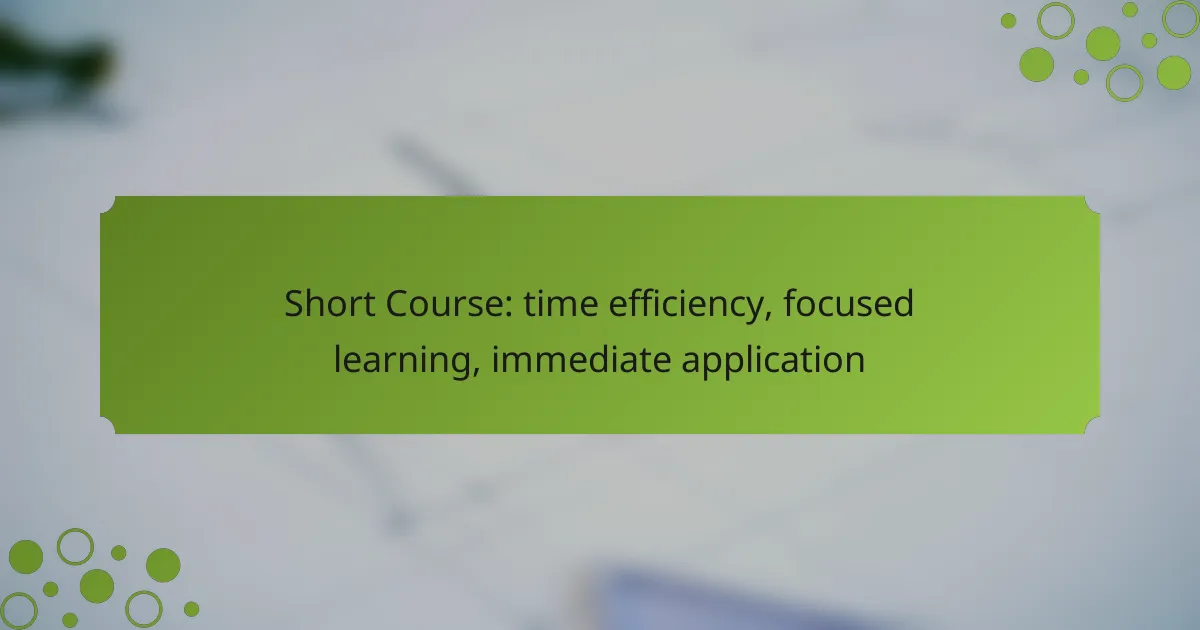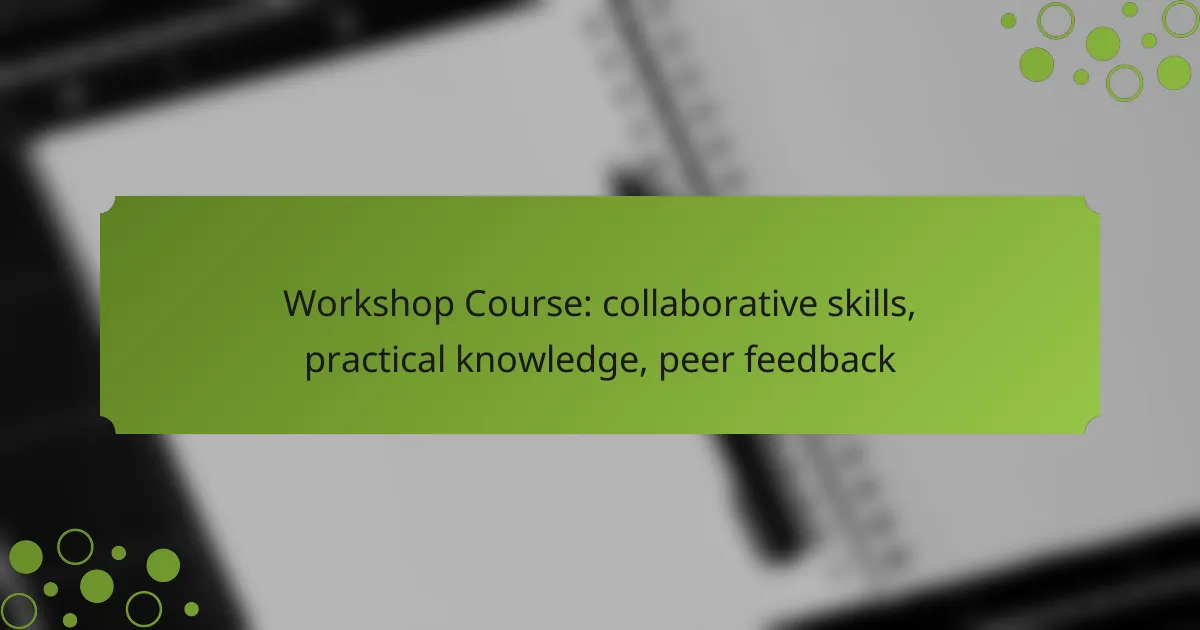Short courses are designed to enhance time efficiency by delivering concentrated content that enables quick acquisition of knowledge and skills. By minimizing distractions and focusing on specific topics, these courses promote effective learning and immediate application in real-world scenarios.

How can short courses improve time efficiency in learning?
Short courses enhance time efficiency in learning by providing concentrated content that allows learners to acquire knowledge and skills quickly. This format minimizes distractions and maximizes retention, enabling immediate application in real-world scenarios.
Focused content delivery
Short courses are designed to deliver targeted content that addresses specific skills or knowledge areas. This focused approach helps learners avoid unnecessary information, allowing them to grasp essential concepts in a shorter timeframe.
For example, a short course on digital marketing might cover key topics like SEO, social media strategies, and analytics in just a few weeks, compared to a full semester course that includes broader, less relevant material.
Flexible scheduling options
Many short courses offer flexible scheduling, accommodating various lifestyles and commitments. This flexibility allows learners to choose times that best fit their schedules, whether through evening classes, weekend workshops, or online modules.
For instance, a busy professional might opt for an online course that they can complete at their own pace, fitting study sessions into their available time slots, thus enhancing their learning efficiency.
Immediate application of skills
Short courses often emphasize practical skills that can be applied immediately in the workplace or personal projects. This immediate applicability reinforces learning and boosts confidence as learners see the results of their efforts quickly.
For example, after completing a short course in coding, a participant might immediately start developing a small application, applying what they learned in a tangible way. This hands-on experience solidifies their understanding and encourages further exploration of the subject.

What are the benefits of focused learning in short courses?
Focused learning in short courses enhances the ability to absorb and apply knowledge quickly. This approach allows learners to concentrate on specific topics, resulting in more effective and efficient education.
Enhanced retention of information
Focused learning improves retention by allowing learners to engage deeply with material over a shorter period. When information is presented in a concentrated format, it becomes easier to remember and recall later.
Techniques such as spaced repetition and active recall can further bolster retention. For example, reviewing key concepts shortly after learning them can help solidify knowledge.
Targeted skill development
Short courses often emphasize specific skills, making it easier for learners to develop competencies that are immediately applicable. This targeted approach allows individuals to gain practical experience in a condensed timeframe.
For instance, a short course on digital marketing may focus on social media strategies, enabling participants to implement these skills in their jobs right away. This immediacy can enhance career prospects and job performance.
Reduced cognitive overload
Focused learning minimizes cognitive overload by limiting the amount of information presented at once. This approach helps learners concentrate on essential concepts without feeling overwhelmed.
To further reduce cognitive strain, it’s beneficial to break down complex topics into manageable segments. For example, a course might cover one aspect of a subject per session, allowing for deeper understanding without excessive information at once.

How do online courses facilitate immediate application?
Online courses enhance immediate application by integrating practical exercises and real-world scenarios into the learning process. This approach allows learners to apply concepts directly, reinforcing knowledge and skills as they progress.
Real-world projects
Real-world projects in online courses provide learners with the opportunity to tackle tasks similar to those they would encounter in their careers. These projects often mimic industry standards, allowing students to develop relevant skills and build a portfolio.
For example, a digital marketing course might require students to create a marketing campaign for a hypothetical product, enabling them to apply theoretical knowledge in a practical context. This hands-on experience can significantly boost confidence and competence.
Case studies and simulations
Case studies and simulations immerse learners in realistic scenarios that require critical thinking and problem-solving. By analyzing real-life cases, students can understand the complexities of decision-making in their field.
For instance, a finance course may use case studies of companies facing financial crises, prompting students to devise strategies for recovery. This method not only enhances understanding but also prepares learners for challenges they may face in their careers.
Interactive learning environments
Interactive learning environments engage students through discussions, quizzes, and collaborative projects, fostering a sense of community and shared learning. These platforms often incorporate tools that allow for immediate feedback, enhancing the learning experience.
For example, platforms like Moodle or Canvas enable students to participate in forums and group activities, which can lead to deeper insights and retention of knowledge. This interactive approach encourages learners to apply what they have learned in real-time, making the learning process more dynamic and effective.

What criteria should you consider when selecting a short course?
When selecting a short course, focus on accreditation, instructor qualifications, and course reviews. These factors ensure that the course is credible, taught by knowledgeable professionals, and has a track record of positive outcomes.
Course accreditation
Course accreditation indicates that a program meets specific standards set by educational authorities or industry organizations. Look for courses accredited by recognized bodies relevant to your field, as this can enhance the value of your learning experience and improve your credentials.
Check if the course is affiliated with reputable institutions or professional associations. For instance, in the U.S., a course accredited by the Council for Higher Education Accreditation (CHEA) holds more weight than one that is not.
Instructor qualifications
Instructor qualifications are crucial for effective learning. Review the instructors’ educational backgrounds, professional experience, and teaching credentials to ensure they have the expertise necessary to deliver the course content effectively.
Consider instructors who have practical experience in the subject matter, as they can provide real-world insights and applications. For example, a course on digital marketing taught by a seasoned marketer will likely offer more relevant knowledge than one led by an academic without industry experience.
Course reviews and testimonials
Course reviews and testimonials provide insights into the experiences of past students. Look for feedback on course content, delivery, and the applicability of skills learned. Positive reviews can indicate a well-structured course that meets learners’ needs.
Utilize platforms that aggregate reviews, such as Course Report or Trustpilot, to get a balanced view. Pay attention to recurring themes in feedback, such as the effectiveness of the teaching methods or the relevance of the material to current industry standards.

What are the best platforms for short online courses in Canada?
In Canada, popular platforms for short online courses include Coursera and Udemy, each offering a range of subjects and learning formats. These platforms cater to various learning styles and provide opportunities for immediate application of skills.
Coursera
Coursera partners with universities and organizations to offer a wide array of short courses, often featuring certificates upon completion. Courses typically last from a few weeks to a couple of months, allowing for focused learning that fits into busy schedules.
When choosing a course on Coursera, consider the reputation of the institution providing the content. Many courses are free to audit, but a fee is required for certification. This can range from CAD 50 to CAD 300, depending on the course length and complexity.
Udemy
Udemy is a marketplace for online courses, allowing instructors to create and sell their own content. This results in a diverse selection of courses, often available at lower prices, typically between CAD 15 and CAD 200, depending on the instructor’s pricing strategy.
When selecting a course on Udemy, look for user ratings and reviews to gauge the quality of the material. Courses can vary significantly in length and depth, so it’s advisable to check the course outline and preview videos before enrolling.



